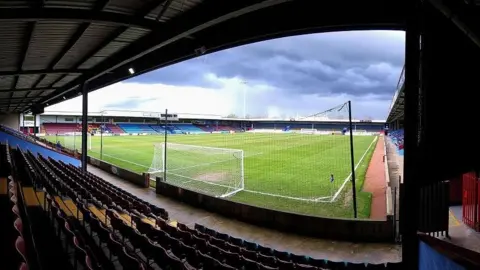


Jack Fenwick,Presenter, Stoppage Time for Scunthorpe
 PA Media
PA MediaPlans to create a new football regulator will not become law before the election, but Labour and the Conservatives say they are committed to bringing in the new rules.
The government announced plans for the regulator last year, but it’s understood there will not be time for the required legislation to be passed before parliament is dissolved ahead of the election.
Labour’s shadow secretary for culture and sport Thangam Debbonaire told the BBC earlier this week that current plans need to go further to protect the financial sustainability of clubs.
Following the news that the laws will not pass before the election a Conservative source said the party is “committed to delivering a sustainable future for local football clubs, with fans at their heart.“
Ms Debbonaire said new laws should benefit “left-behind” areas of the country where the sport is “bound up with a sense of identity and a sense of place”.
Conservative MP Tracey Crouch, who first recommended the regulator, said there is now a “ready made Bill for the next government” and she is “100% convinced” that the regulator will be created.
A new Radio 4 documentary, ‘Stoppage Time for Scunthorpe’, tells the story of how Scunthorpe United almost went out of business twice in the last 18 months.
After a period of ambitious spending that never quite panned out, the funds dried up and results on the pitch took a dramatic downwards turn.
Then-owner Peter Swann transferred ownership of the club’s stadium Glanford Park into his own company.
In January 2023, Scunthorpe United was served with a winding up order from HMRC, nine months after being relegated to non-league football for the first time in 72 years.
With fans fearing the worst could be just days away, they were given hope.
“Completely from left field, we heard a name,” said Matt Ellis, host of the fan podcast Iron Bru.
“And Hilton just came out of nowhere and swept to power if you like.”
After initial jubilation, things turned sour once more.
Another relegation followed and an investigation by The Athletic website revealed that David Hilton had previously been sentenced to two years in prison for fraud.
He put the club up for sale and it was saved from extinction again when local businesswoman Michelle Harness gathered a consortium of nearby business owners.
Working with local Conservative politicians, Ms Harness used £2.5m of central government money from the Department for Levelling Up to buy back Glanford Park and put it into a community asset scheme, meaning the club and the stadium can never be separated again.
 Getty Images
Getty ImagesIt’s understood the Labour Party is looking at how the issue of football regulation could be used in its attempt to win back traditional Labour seats like Scunthorpe, that switched to the Conservatives in 2019.
Ms Debbonaire said “it’s working people who go to football matches” and that “for many of the towns where there’ve been clubs at the brink, they’ve also been towns that successive Tory governments have indeed left behind and not done any levelling up whatsoever.
“People feel really fed up in a lot of those towns, but it’s also about preserving and enhancing and protecting the game of football for fans across the country.”
Both the Conservatives and Labour believe that the test carried out to decide whether someone is fit to own a football club should be strengthened.
Former Scunthorpe United owner David Hilton, whose own conviction was spent when he bought the club, agrees.
“I am certain the convictions do not warrant a life sentence,” he said.
“I think each case should be judged on its own merits with comprehensive financial checks and all convictions declared without the scope for spent convictions to be omitted.”
Calling for a strengthened owners test, Ms Debbonaire said “too often, unfortunately, there have been business owners who’ve taken on a football club but not taken any interest in it and run it into the ground or just not run it properly.”
She said she would be pushing for an amendment to the Football Governance Bill to make it clearer that the regulator will “have all the tools they need to assess that” someone is fit to own a football club.
“It’s more than a job, isn’t it? You’re actually being custodian of something really very precious to local people, to fans.
“So I want to see every prospective owner required to show that they are a person of honesty and integrity, that they have the required amount of financial resources in order to be able to sustain the club and thirdly, that that financial resource doesn’t come from criminal activity.”
She refused to say if Labour would use central government money to buy back stadiums that had been separated from clubs, as the Conservative government has done in places such as Bury and Scunthorpe.
The government was asked to give an interview to Radio 4, but said nobody was available.